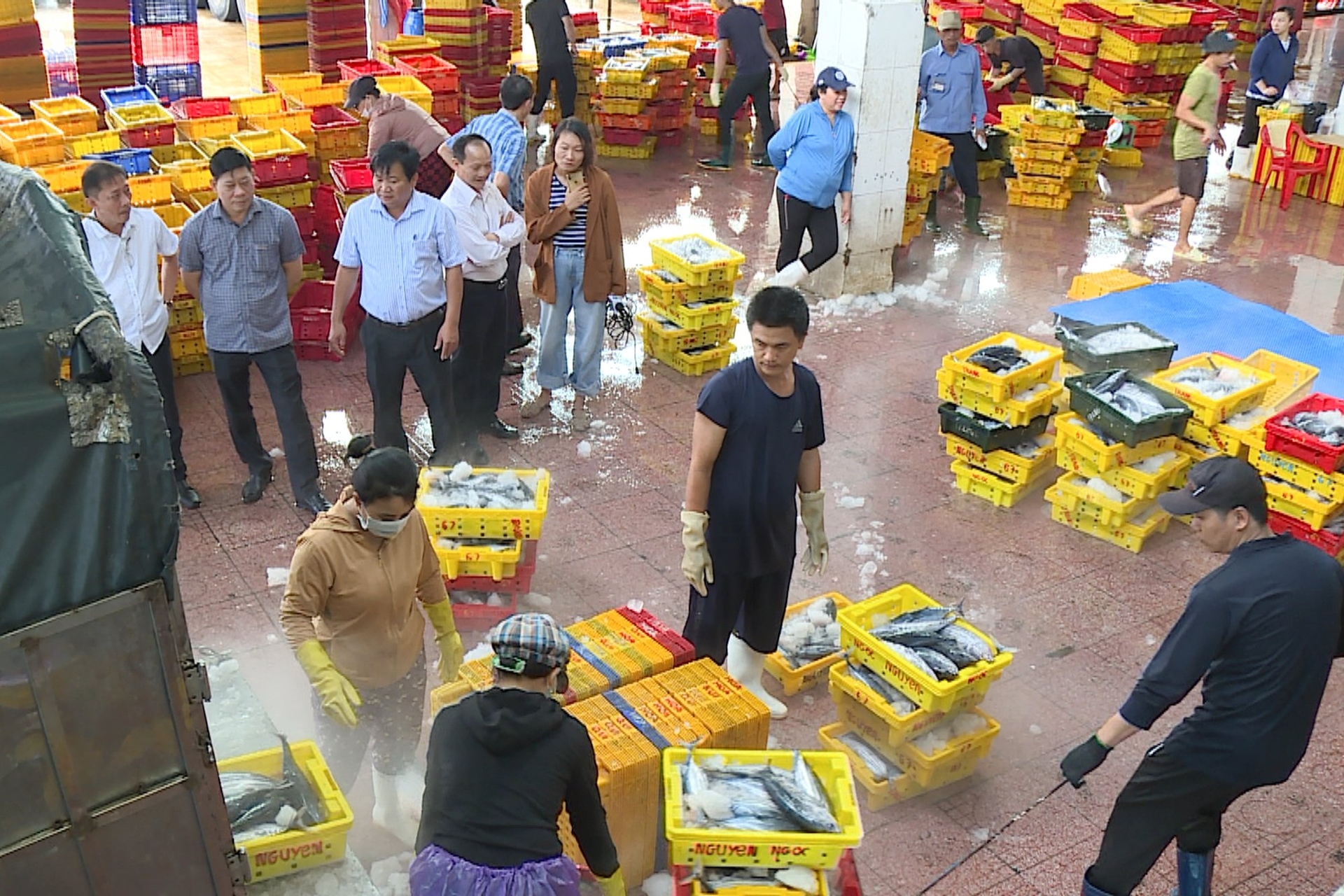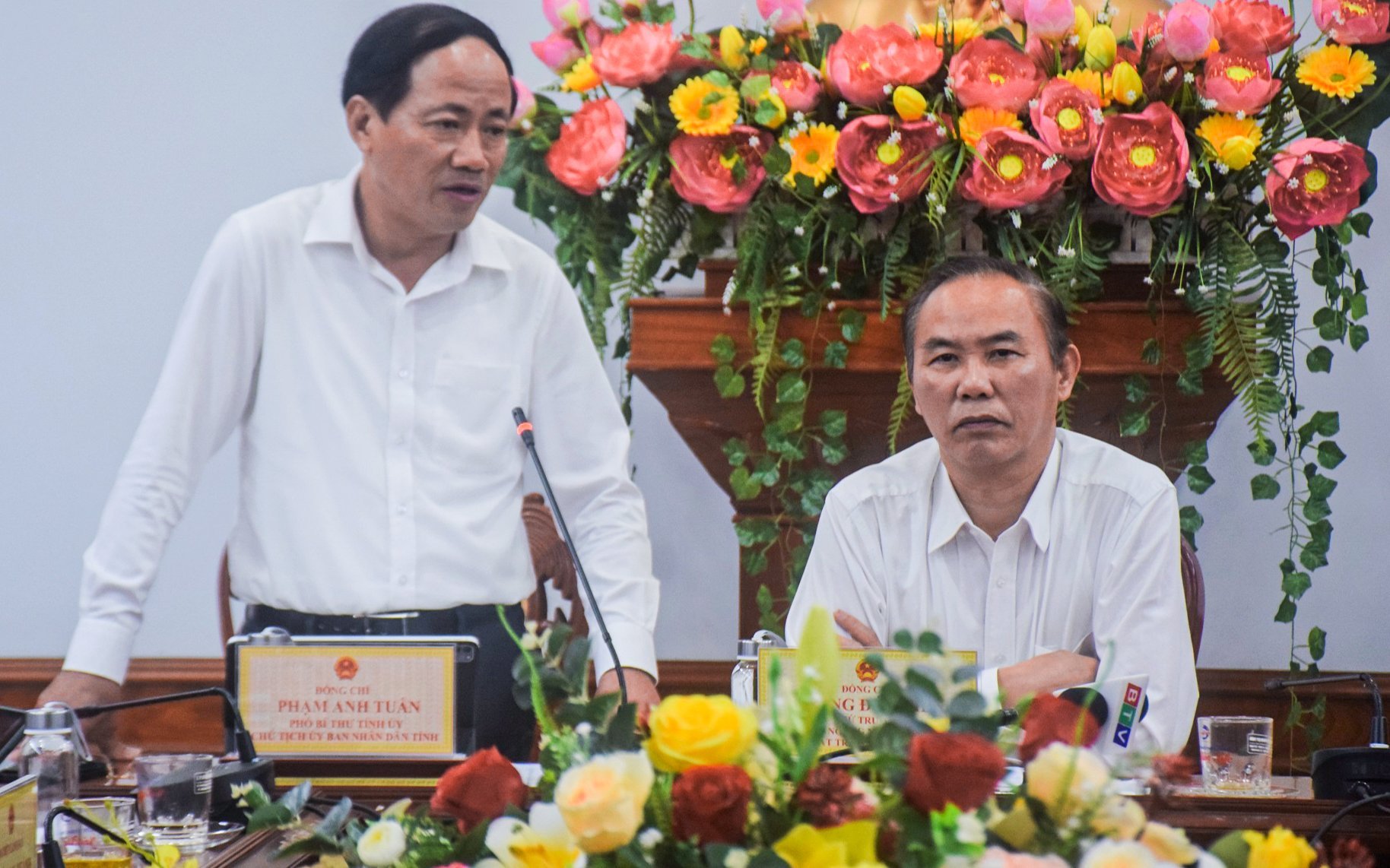May 24, 2025 | 16:25 GMT +7
May 24, 2025 | 16:25 GMT +7
Hotline: 0913.378.918
May 24, 2025 | 16:25 GMT +7
Hotline: 0913.378.918
On October 4, Deputy Minister of Agriculture and Rural Development Phung Duc Tien presided over a working session with the People's Committee of Binh Dinh Province and functional agencies on combating illegal, unreported, and unregulated (IUU) seafood exploitation in preparation for the 4th European Commission (EC) Inspection Team's visit.
Previously, the Ministry of Agriculture and Rural Development's working group labored on the aforementioned content at the Binh Dinh Fisheries Subdepartment, Binh Dinh Fishing Port Management Board, and local seafood export processing businesses.

Deputy Minister of Agriculture and Rural Development Phung Duc Tien proposed that in the coming days, Binh Dinh should strengthen the management of fishing vessels entering and leaving the port. Photo: V.D.T.
At the beginning of the meeting, Deputy Minister Phung Duc Tien asked members of the working group not to discuss what Binh Dinh has done to combat IUU fishing, but rather to focus on the deficiencies that must be immediately addressed prior to the arrival of the EC Inspection Team on October 10.
Concerning the inspection and control of fishing vessels entering and exiting the port, members of the MARD's working group stated that although Binh Dinh has done quite well in this regard, there are still some fishing vessels of Binh Dinh fishermen that lack exploitation licenses and registration but still import and export at Tam Quan Fishing Port (Hoai Nhon town). Before the European Commission arrives to inspect, the functional agencies and local authorities must have a plan to "erase" this situation.
The work of inspection and control of fishing vessels docking and offloading products at Binh Dinh fishing ports has been performed well; however, the force conducting the inspection and control work is insufficient; the functional sector of this province must be augmented.
The working group also discovered that Binh Dinh fishing vessels continued to record fishing documents inconsistently and that fishing locations and capture nets were inconsistent and non-compliant with regulations. Numerous fishing vessel license plates were obscured and illegible. In addition, the working group requested that local authorities and functional agencies collaborate with ship proprietors to request a re-paint.
Prior to the arrival of the EC Inspection Team, there is a high likelihood that Binh Dinh will elucidate a quite severe issue that the inspection team identified. It is feasible for the EC Inspection Team to trace the cargo of over 200 tons of imported swordfish by sea.

The working delegation of the Ministry of Agriculture and Rural Development inspected the work against IUU fishing violations at Quy Nhon Fishing Port (Binh Dinh). Photo: V.D.T.
No countermeasures, no trickery
Mr. Pham Anh Tuan, Chairman of the Binh Dinh Provincial People's Committee, stated at the meeting that fighting against IUU exploitation must not involve deception.
According to Mr. Nguyen Quang Hung, Director of the Department of Fisheries Surveillance, Binh Dinh will be in the "sight" of the EC working group during this inspection because this province has a significant offshore fishing force.
As a result, Mr. Hung requested that Binh Dinh authorities promptly examine all dossiers of product batches exported to Europe to ensure that all have exploitation licenses, as per the recommendations of the EU.
Mr. Hung suggested that Binh Dinh has nearly 3,300 offshore fishing vessels, of which 34 are not actively engaged in fishing; however, it is required to clarify whether or not these 34 ships have ceased fishing.

Mr. Pham Anh Tuan (left), Chairman of Binh Dinh Provincial People's Committee, requested the working group of the Ministry of Agriculture and Rural Development to help the functional sector of this province overcome shortcomings. Photo: V.D.T.
"Enterprises in the region engaged in the export of fisheries must ensure that the documents exported to Europe are comprehensive. This issue will be thoroughly examined by the EC," Mr. Hung emphasized.
Chairman of the People's Committee of Binh Dinh province, Pham Anh Tuan, requested that the working group of the Ministry of Agriculture and Rural Development assist the functional divisions of this province in overcoming the deficiencies so that everything will be in order when the EC Inspection Team arrives. Mr. Tuan instructed the authorities of Binh Dinh to take the recommendations of the working group and address deficiencies in the work of combating IUU fishing in a scientific and truthful manner.
"From now on, the entire political system of the province must concentrate all resources on resolving all extant issues, as the EC's inspection date is rapidly approaching. These days, we expect that the delegation will remain in Binh Dinh to point out deficiencies, particularly lack of traceability so that the authorities can address them, Mr. Tuan proposed.
Phung Duc Tien, Deputy Minister of Agriculture and Rural Development, proposed at the conclusion of the meeting that, in the coming days, Binh Dinh should strengthen the management of fishing vessels entering and leaving the port; Fishermen are advised to keep a catch log, as this is the root of the problem of seafood traceability.
In 2023, Binh Dinh must rigorously manage fishing vessels that violate maritime zones and are seized by foreign nations. Because, according to the Deputy Minister, the issue of how to handle fishing vessels that violate regulations is a major concern for the EC. If Vietnam does not take strict action, it will be difficult to eliminate the "yellow card" for IUU fishing.
Translated by Linh Linh

(VAN) In the tranquil wetlands of Van Long, there are quiet souls who guard the forests, nurture the waters, and oversee every bird and troop of langurs as protecting the essence of a living heritage.

(VAN) WWF, GIZ, IUCN, UNDP call for biodiversity conservation and sustainable development must be regarded as a unity in strategies for a green future.

(VAN) On celebration of International Day for Biological Diversity, Deputy Minister Nguyen Quoc Tri called for practical actions to address nature and biodiversity conservation.

(VAN) Dr. Hoang Thi Thanh Nhan – Deputy Director of the Nature and Biodiversity Conservation Agency – highlighted this on the International Day for Biological Diversity, May 22, 2025.
![Ho Chi Minh city adapts to climate change: [2] Accelerating action](https://t.ex-cdn.com/nongnghiepmoitruong.vn/608w/files/chiqk/2025/05/22/4024-4220-bien-doi-khi-hau-1-100626_766.jpg)
(VAN) Clearly recognizing the challenges posed by climate change, Ho Chi Minh city has swiftly shaped its policies and implemented practical solutions to adapt.

(VAN) Rice straw is no longer just a discarded byproduct, but it is becoming a green resource that helps farmers in the Mekong Delta reduce emissions and promote circular, sustainable agriculture.

(VAN) Other Effective Area-based Conservation Measures (OECMs) are solutions that contribute effectively to achieving the goals of the Kunming–Montreal Global Biodiversity Framework.